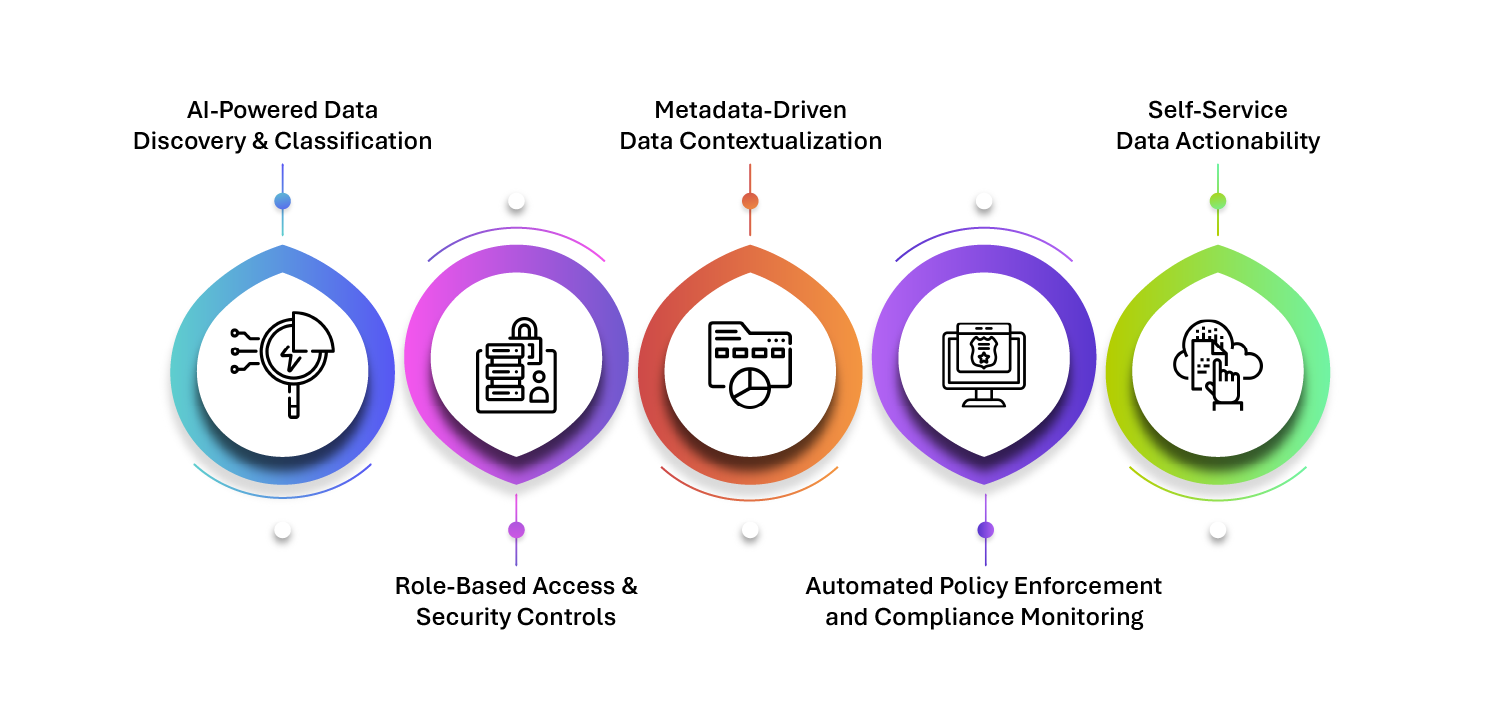What is Self-Service Data Management?
Self-service data management is an approach that empowers business users, data creators, and application owners to independently access, manage, and utilize data without relying on centralized IT or data teams. It enables organizations to decentralize data governance while maintaining security, compliance, and operational efficiency.
In traditional data management models, IT teams control data access, security, and administration, often leading to bottlenecks, delays, and inefficiencies. Self-service data management shifts this paradigm by putting data control directly in the hands of those who generate and use it, fostering agility and democratization of data within an organization.
How Does Self-Service Data Management Work?

Self-service data management integrates AI-driven platforms, automation, and federated governance to ensure secure, efficient, and user-driven data control. It eliminates IT bottlenecks while maintaining governance and compliance.
- AI-Powered Data Discovery & Classification
Users can automatically locate, categorize, and classify structured and unstructured data across multi-cloud and hybrid environments. This enhances visibility, eliminates redundancy, and ensures compliance.
- Role-Based Access & Security Controls
Organizations enforce role-based access controls (RBAC) and security policies to ensure data remains protected. Only authorized users can access, modify, or share sensitive information based on predefined permissions.
- Metadata-Driven Data Contextualization
Automated metadata tagging and lineage tracking provide deep insights into data’s origin, usage, and relevance. This helps businesses understand how data flows and supports strategic decision-making.
- Automated Policy Enforcement & Compliance Monitoring
Integrated compliance frameworks (e.g., GDPR, HIPAA) ensure that data handling adheres to regulatory standards. Automated enforcement monitors usage, flags risks, and generates audit reports in real-time.
- Self-Service Data Actionability
Users can move, archive, delete, or transform data without IT intervention, optimizing storage and operational costs. This enables real-time data restructuring, cleanup, and compliance-driven management.
Why is Self-Service Data Management Important?
Organizations generate massive volumes of unstructured data, yet accessing and utilizing it efficiently remains a challenge. Traditional, centralized data management models often create bottlenecks, delaying insights and decision-making. Self-service data management transforms this approach by empowering users with direct control over their data while maintaining security and compliance. By decentralizing data ownership, businesses can drive agility, enhance governance, and unlock the full potential of their data. Here’s why self-service data management is becoming a strategic imperative.
Breaking Free from IT Bottlenecks: Empowering Data Ownership at Scale
For decades, enterprises have relied on IT as the gatekeeper of data, leading to inefficiencies, restricted access, and operational slowdowns. Self-service data management shatters this outdated model by giving business users direct access to the data they generate and need. Data owners no longer have to wait for IT approvals—instead, they control and act on their data in real-time. This shift doesn’t just improve efficiency; it transforms the way businesses operate, fostering a culture where those closest to the data make the most informed decisions.
From Data Silos to Instant Insights: Making Real-Time Decisions Possible
Data is only as valuable as the speed at which it can be used. In high-stakes industries like finance and healthcare, waiting for IT to retrieve or process data can mean financial loss or even risks to human lives. With self-service data management, decision-makers have instant access to critical insights without delays. A financial risk analyst can detect fraudulent transactions in real-time; a healthcare provider can access patient records for immediate diagnosis. By eliminating dependency on IT, businesses accelerate decision-making, reduce response times, and gain a strategic advantage in a fast-moving world.
Security Without Compromise: Giving Access While Keeping Data Safe
Granting employees access to data shouldn’t come at the cost of security. Self-service data management balances accessibility with protection by embedding security controls into the data itself. Role-based access, automated policy enforcement, and continuous compliance monitoring ensure that users can only access what they are authorized to see. Whether handling personally identifiable information (PII) or financial records, businesses maintain regulatory compliance (GDPR, HIPAA, PCI-DSS) without sacrificing agility. This approach ensures that security is proactive, not reactive—enabling safe, controlled data democratization.
Taming the Data Chaos: Turning Unstructured Data into Strategic Value
Unstructured data—scattered across emails, PDFs, images, videos, and logs—makes up 80-90% of enterprise information. Yet, most of it remains untapped, buried in fragmented systems. Self-service data management changes this by leveraging AI-driven discovery, automated classification, and metadata tagging. Instead of spending hours searching for the right file, users can instantly locate relevant data. In healthcare, radiologists can quickly retrieve specific MRI scans; in retail, customer behavior insights become accessible in seconds. The result? Unstructured data transforms from a liability into a strategic business asset.
The End of Dirty Data: Building a Foundation of Accuracy and Compliance
Data errors lead to faulty analytics, misguided strategies, and compliance failures. Self-service data management ensures that every piece of data—whether structured or unstructured—is validated, cleansed, and classified at the source. Automated compliance tools enforce data retention policies, prevent duplication, and eliminate outdated or irrelevant files. This isn’t just about better data hygiene—it’s about creating a foundation for AI, analytics, and regulatory compliance, ensuring that organizations operate with clean, reliable, and actionable data.
Scaling Without Limits: Future-Proofing Data Management for Growth
As businesses expand across global markets, hybrid cloud environments, and AI-driven operations, legacy data management approaches struggle to keep up. Self-service data management provides a scalable, decentralized framework that grows with the enterprise. It removes IT bottlenecks, allowing new teams, geographies, and workloads to be seamlessly integrated without overwhelming infrastructure. Whether supporting multinational operations, AI-driven automation, or cloud migration, self-service data management ensures businesses remain agile, scalable, and prepared for the future.
Getting Started with Data Dynamics:
- Learn about Unstructured Data Management
- Schedule a demo with our team
- Read the latest blog: Data Fabric and AI: The Blueprint for Dominating Unstructured Data in 2025






